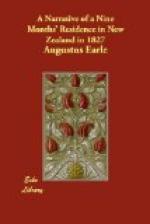Although prepared for war, we were very well pleased to find no attack was made upon us. Indeed, from the first, it had been my decided opinion, that unless we interfered, and made ourselves by that means obnoxious, they had too much respect for us, and were too anxious to retain our kindly feelings towards them, to molest us; at the same time, I felt that it might be a very politic measure to show them what powerful resistance we could make, if driven to extremities.
After passing a week of the greatest anxiety, on account of our expected invasion, it afforded us the utmost satisfaction to receive a visit from Mr. Hobbs, the Wesleyan missionary, one of the persons who had visited the war-camp of the assembled chiefs, who were convened, on the death of our lamented friend George, to debate and decide upon the momentous question of peace or war.
The subject (our informant stated) had been gone into at great length, and stormy and fierce had been the discussion. Finally, the good sense of the elder and more experienced chiefs prevailed over the fiercer passions of the younger, and peace was decided upon. This event forms a new era in “The Political History of the Few Zealanders,” it being the first time so great an assemblage had met to discuss openly a national question, or in which they had allowed cool reasoning and good sense to prevail over their habitual ferocity. As may naturally be supposed, where such various interests were at stake, this pacific measure was not effected without considerable opposition from the young and furious chiefs. The provocations given by them to the elders, whose voices were for peace, were considerable. They did not confine themselves to abuse, but fired several muskets during debate, in hopes that one shot out of the many might prove fatal; which, if it had, and any distinguished chief had been killed, or even wounded, it would have immediately thrown all into confusion. Even when pacific measures were decided upon by a very large majority, and the chiefs were about to separate, a bullet was fired from the pa, which had evidently been aimed at a chief, a well-known ally of the late Shulitea, as it fell at his feet, and the earth it threw up fell upon him. For a few seconds surprise kept all silent; but, as the angry chief rose up, and was about to address the crowd, his friends eagerly surrounded him, and hurried him away.




